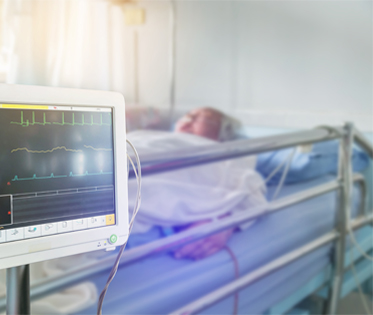Respiratory Compromise
The Institute of Medicine estimated that up to 98,000 Americans die each year from medical errors based on 1984 data. In the subsequent three decades, technology’s role in healthcare has increased exponentially, often with very favorable improvements in outcomes (e.g., minimally invasive surgery) but not without pitfalls. A recent paper estimated 210,000 to more than 400,000 deaths per year are associated with preventable harm in hospitals. In addition to death, serious harm is likely to be 10- to 20-fold more common than lethal harm.
Respiratory compromise is a common cause of preventable harm and death:
- Respiratory causes are the #1 antecedent to code blue
- Respiratory deterioration are the leading trigger of rapid response calls
- Respiratory issues are the #1 cause of ICU admissions
- Respiratory compromise is one of three indicators accounting for 66 percent of all preventable patient safety issues
While not all cases of respiratory compromise are preventable, many are preventable through early identification and intervention. Public media and medical literature is replete with examples and the majority of experienced clinicians can relate to professional experience which demonstrate reported cases are likely a small tip of the iceberg.
Respiratory Compromise Institute
In 2015, the Respiratory Compromise Institute (RCI) was formed to examine the challenges of respiratory compromise across the full spectrum of health care delivery: hospitals, nursing homes, and the home environments.
What is Respiratory Compromise?
Respiratory compromise (RC) is defined as a state in which there is a high likelihood of decompensation into respiratory failure or death, but in which continuous monitoring and early intervention might prevent or mitigate decompensation.
What are the etiologies to respiratory compromise?
RC may arise from several different pathways including impaired control of breathing (e.g., opioids), parenchymal lung disease, airway disease, and cardiovascular conditions. Our hypothesis is that these pathways have similar clinical points (e.g., changes in oxygenation and/or ventilation) which can be detected early allowing intervention may mitigate further deterioration.
Can risk of respiratory compromise be assessed?
Many risk factors for RC have been identified in the literature. Generally, these fall into three categories: 1) patient factors (e.g., existing respiratory disease, comorbidities, etc.), 2) iatrogenic factors (e.g., respiratory depressive medications, procedures, etc.), and 3) care setting factors (e.g., nurse to patient ratios, protocols for recognition, etc.). These factors can be assessed with a level of monitoring prescribed commensurate with level of risk.
How might continuous monitoring and early intervention mitigate the cascade into respiratory failure?
Today’s paradigms are focused on rescue rather than prevention. As the severity of RC increases, so too does the complexity of intervention, workflow disruption, need for higher levels of care, costs, and mortality. Concurrently, reversibility of the RC cascade (i.e., prognosis), and the likelihood of favorable outcomes are declining. In certain patient populations at risk for respiratory compromise, continuous monitoring has shown favorable outcomes both clinically and financially (e.g., Dartmouth, Maddox, Fox, etc.).
What are the goals of the Respiratory Compromise Institute?
The institute was formed to better define respiratory compromise and explore the potential for improved solutions to reduce preventable harm and deaths. The institute is comprised of a coalition of representatives and thought leaders from multiple physician, nursing, respiratory therapist, and patient safety organizations with support from industry sources. Our objectives are to raise awareness, provide education, and encourage research of RC.
How can we support the Respiratory Compromise Institute?
The Institute has applied to the Internal Revenue Service for classification as a 501(c)(3) tax exempt organization. Pending that review and approval, companies wishing to support the Institute’s goals and research should contact the Institute directly for further information. For individuals wishing to support the Institute, please contact Phil Porte at phil@respiratorycompromise.org.






